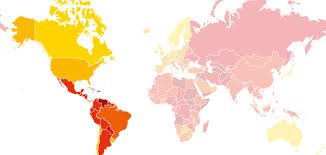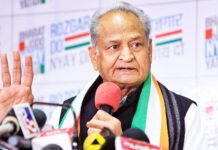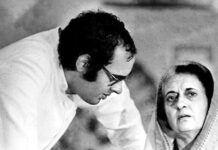These are troubling times for American democracy. Is Donald Trump setting a dark precedent for future Presidents?
LONDON: “All power tends to corrupt and absolute power corrupts absolutely”, wrote the 19th century British historian Lord Acton, underscoring his belief that unchecked power poses the greatest threat to human freedom. Acton would currently be having a field-day in America as corruption runs rampant at the highest level. Brian Klaas, an assistant professor of global politics at University College London agrees. The creator of the podcast “Power Corrupts”, which reveals the hidden and often nefarious forces that shape our world, Klaas insisted in a recent interview with the BBC that “what is happening in the US is blatant corruption—the abuse of public office for private gain”. Klaas believes there is “no question that corruption is happening right now, and it’s happening quite openly”. The White House maintains that because it’s open it can’t be corruption, a point which Klaas refutes, saying that what’s happening under Donald Trump “is beyond that pale in normal democracies. Because of rampant corruption, democracy in America is dying by a thousand cuts.” Many would concur.
Trump’s Cabinet is the wealthiest in American history, stocked with billionaires, many of whom were mega donors to his election campaign. According to Axios’s Zachary Basu, “billionaire DNA coursed through the US election system like never before, smashing campaign finance records and ushering in a new age of influence, while moral guardrails simply vanished”. Some 150 billionaire families spent upward of $2 billion during the election, shredding populist taboos, driving news cycles and increasingly shaping the terms of American democracy. The result was a payday for the powerful.
The biggest winner, though, appears to be Trump’s own family. According to Basu, Trump family members have enjoyed an historically lucrative period “leveraging their proximity to power and raking in billions of dollars through a flood of ethically murky business adventures”. As Alex Shephard wrote in the New Republic, “for Trump, the business of America and the Trump family business are one and the same.” While most Presidents try to avoid even the appearance of using the office or public policy for personal enrichment, Trump has blended official power and personal business in unprecedented ways, often in plain sight. Matthew Dallek, a political historian at George Washington University, located a few blocks from the White House, says Trump is showing a different side in his second incarnation as President—“he now feels liberated to wear his corruption on his sleeve”.
Trump’s sons, meanwhile, are spearheading a family crypto venture that has raked in hundreds of millions of dollars. Democrats have long accused Trump and his family of profiting from the presidency, and recently two congressmen, Senator Chris Murphy and Representative Sam Liccardo, introduced a bill targeting Trump’s multibillion-dollar meme coin, which Murphy called “the single most corrupt act ever committed by a President”. On 25 April, NBC News carried the story that Trump’s official website for his meme coin had announced that the top 220 holders of the coin were invited to an intimate private dinner with the President at his golf club outside of Washington DC, scheduled for 22 May. Moreover, the top 25 investors would also receive an invitation to a “VIP White House Tour” the following day. The $TRUMP meme coin surged more than 50% after the dinner news broke, boosting its total market value to $2.7 billion and sparking scrutiny from lawmakers on both sides. Even staunch Trump supporters expressed uneasiness about the event. But while using untraceable crypto currency to pay for access to the President raises questions for many lawmakers, there were no laws barring Trump and the organisation from proceeding as planned.
Also last month, the New York Times reported that Eric Trump and Zach Witkoff, the son of Trump’s Middle East envoy Steve Witkoff and the founder of the Trump family cryptocurrency business, announced in Dubai that a fund backed by Abu Dhabi would be making a $2 billion business deal using the Trump firm’s digital coins. The transaction would be a major contribution by a foreign government to Donald Trump’s private ventures, one that stands to generate hundreds of millions of dollars for the Trump family. Not only that, the NYT makes the point that “the splashy announcement served as an advertisement to crypto investors worldwide about the potential for forming partnerships with a company tied to President Trump, who is listed as World Liberty’s chief crypto advocate”. Once a crypto sceptic, Trump embraced digital currencies on the campaign trail last year as the industry poured tens of millions of dollars into the 2024 election. In September, he and his sons unveiled World Liberty, which they pitched as a new kind of internet bank that would allow people to borrow and lend money using cryptocurrencies. Just as Trump’s first term blurred the line between public office and personal gain, so his second term has completely erased it, turning the presidency into a profit engine for his brand and bloodline.
As well as his cryptocurrency deals, Donald Trump is set to gain from real-estate developments during his second term in office. Luxury hotels, real estate and golf courses are at the core of the Trump family businesses. According to the website citizensforethics.org, during Trump’s second term of office developers will be working on planning, building and opening a total of 20 Trump-branded projects around the globe, two of which will be added to existing properties in India: Trump Tower in partnership with Lodha Group Mumbai; and Trump Towers in Pune in partnership with Panchshil Realty. In a total of nine countries, Trump’s project developers will seek subcontractors, buyers and permits from governments. As the website points out, this will not only triple the number of Trump properties operating abroad, but will also create massive conflicts of interest for the President as he balances American foreign policy with his own financial incentives. Trump will know that his decisions made as President will affect his bottom line, while officials in those countries will have the opportunity to provide special treatment to the US President, or to punish him for decisions they don’t like.
When challenged, Trump supporters point to the fact that none of this is unprecedented and he is not the first President to enrich himself in office. Back in the 1920s, President Warren Harding and several members of his cabinet rewarded themselves with hundreds of thousands of dollars (millions in today’s money) when state lands were leased to private oil companies in return for gifts and kickbacks. There has also been no shortage of scandals in the Oval Office since then. Richard Nixon resigned in 1974 after burglars linked to his re-election campaign broke into the Watergate headquarters of the Democratic opponents to install listening devices and tap phones. President Bill Clinton’s reputation is for ever tainted by sexual encounters with a young woman, Monica Lewinsky. But, in the century since Harding died, cashing in on the presidency to accumulate riches has never been a thing—until now.
Even by the standards of America’s warped history, what seems genuinely new is the unabashed corruption on display. No president has traded favours like Trump. As Ross Barkan claims in the New York magazine Intelligencer, “No President has ever tried to blatantly enrich himself like this while in office. No President has ever hung a ‘for-sale’ sign over the White House, not like this, anyway.” The recent example of the gift of the $400 million luxury Boeing 747-8 from the Qatari royal family, dubbed the “palace-in-the-sky”, has raised eyebrows across America’s political establishment, with the Democrats describing it as “the largest bribe in American history”.
These are troubling times for American democracy. Is Donald Trump setting a dark precedent for future Presidents? Will tomorrow’s Republicans and even Democrats decide they too can turn the presidency into an obscene get-rich-quick scheme? “Maybe”, says Barkan, “but we won’t know until tomorrow comes.” The title of his piece in the Intelligencer says it all: “Donald Trump is a Crook—But he’s their Crook”.
In the meantime, Americans must endure a breadth of corruption no previous generation has ever known, corruption which greatly damages America’s image to the world. “Even if such naked profiteering from the highest office in the land is not criminal”, said Connor Stringer in the Telegraph, “for America, it’s bad optics.”
*John Dobson is a former British diplomat, who also worked in UK Prime Minister John Major’s office between 1995 and 1998. He is currently a visiting fellow at the University of Plymouth.








